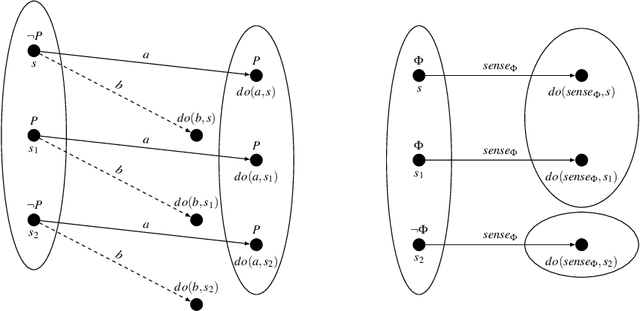Shakil M. Khan
Ryerson University
Reasoning about Actual Causes in Nondeterministic Domains -- Extended Version
Dec 21, 2024Abstract:Reasoning about the causes behind observations is crucial to the formalization of rationality. While extensive research has been conducted on root cause analysis, most studies have predominantly focused on deterministic settings. In this paper, we investigate causation in more realistic nondeterministic domains, where the agent does not have any control on and may not know the choices that are made by the environment. We build on recent preliminary work on actual causation in the nondeterministic situation calculus to formalize more sophisticated forms of reasoning about actual causes in such domains. We investigate the notions of ``Certainly Causes'' and ``Possibly Causes'' that enable the representation of actual cause for agent actions in these domains. We then show how regression in the situation calculus can be extended to reason about such notions of actual causes.
Behaviour Explanation via Causal Analysis of Mental States: A Preliminary Report
May 16, 2022Abstract:Inspired by a novel action-theoretic formalization of actual cause, Khan and Lesp\'erance (2021) recently proposed a first account of causal knowledge that supports epistemic effects, models causal knowledge dynamics, and allows sensing actions to be causes of observed effects. To date, no other study has looked specifically at these issues. But their formalization is not sufficiently expressive enough to model explanations via causal analysis of mental states as it ignores a crucial aspect of theory of mind, namely motivations. In this paper, we build on their work to support causal reasoning about conative effects. In our framework, one can reason about causes of motivational states, and we allow motivation-altering actions to be causes of observed effects. We illustrate that this formalization along with a model of goal recognition can be utilized to explain agent behaviour in communicative multiagent contexts.
Towards A Logical Account of Epistemic Causality
Oct 31, 2019


Abstract:Reasoning about observed effects and their causes is important in multi-agent contexts. While there has been much work on causality from an objective standpoint, causality from the point of view of some particular agent has received much less attention. In this paper, we address this issue by incorporating an epistemic dimension to an existing formal model of causality. We define what it means for an agent to know the causes of an effect. Then using a counterexample, we prove that epistemic causality is a different notion from its objective counterpart.
* In Proceedings CREST 2019, arXiv:1910.13641
 Add to Chrome
Add to Chrome Add to Firefox
Add to Firefox Add to Edge
Add to Edge